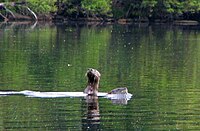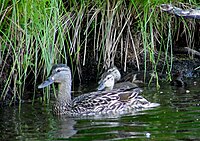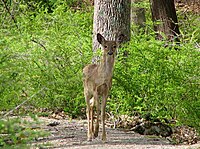| Harriman State Park | |
|---|---|
 View from Harriman State Park, facing north View from Harriman State Park, facing north | |
 | |
| Location | Orange / Rockland counties, New York, United States |
| Coordinates | 41°14′35″N 74°06′02″W / 41.24306°N 74.10056°W / 41.24306; -74.10056 |
| Area | 47,527 acres (192.33 km) |
| Established | 1910 |
| Visitors | 1,425,000 (in 2014) |
| Governing body | Palisades Interstate Park Commission |
At 47,527 acres (192.33 km), Harriman State Park is the second largest state park in the U.S. state of New York. Located in Rockland and Orange counties 30 miles (48 km) north of New York City, it is a haven for hikers with over 200 miles (320 km) of hiking trails. The park is also known for its 31 lakes, multiple streams, public camping area, and great vistas. The park's hiking trails are currently maintained by volunteers from the New York - New Jersey Trail Conference.
On its northeastern edge, Harriman State Park borders the 5,000-acre (20 km) Bear Mountain State Park as well as the United States Military Academy's 16,000-acre (65 km) forest reserve. To the southwest, it partly borders the state-owned 18,000-acre (73 km) Sterling Forest reserve. These areas, together with the state's Storm King forest reserve of 1,900 acres (7.7 km), amount to contiguous protected forests that are substantially larger than Harriman alone.
History

Edward Harriman and Mary Averell Harriman owned 30,000 acres (120 km) in Arden, New York as part of their estate. They opposed the state's decision to build a prison at Bear Mountain and wanted to donate some of their land to the state in order to build a park. A year after the death of her husband in 1909, Mary Harriman proposed to Governor Charles Evans Hughes that she would donate 10,000 acres (40 km) of land and $1 million for the creation of a new state park. As part of the deal, the state would do away with the plan to build the prison, appropriate an additional $2.5 million to acquire additional land and construct park facilities. The Palisades Interstate Park Commission would have its authority extended north into the Ramapo Mountains and the Hudson Highlands, and New Jersey would also contribute an amount of money deemed reasonable by the Commission. The state agreed and on October 29, 1910, W. Averell Harriman presented a deed for the land and a million-dollar check to the Commission.

In 1913, Major William A. Welch started construction on the road from Bear Mountain to Sloatsburg, known today as the Seven Lakes Drive. In 1962 a new road from the Southfields section of Tuxedo to Kanawake Circle was opened. There were also numerous other roads completed around Bear Mountain and Dunderberg Mountain in order to make it easier for people to reach the new park. In addition, there was steamboat service from Manhattan offering round-trip tickets for 85 cents for adults and 45 cents for children.
The park received a large influx of free labor during the Great Depression. The Civilian Conservation Corps (CCC) offered thousands of young men work such as building roads, trails, camps and lakes. Projects completed by the CCC in the park included Pine Meadow, Wanoksink, Turkey Hill, Welch, Silvermine and Massawippa Lakes. In 1974, Northwest Orient Airlines Flight 6231 crashed in the park. In 1993, the World Orienteering Championships were held at Harriman State Park.
Trails

There are more than forty marked hiking trails (225 mi (362 km) total) in Harriman, and another 57 unmarked trails and woods road (103 mi (166 km), foot traffic only). Some of the better known trails include the following:
- Appalachian Trail, 18.8 miles (30.3 km) are within the park
- Blue Disc Trail, 2.8 miles (4.5 km)
- Long Path, 25 miles (40 km) are within the park
- Pine Meadow Trail, 5.5 miles (8.9 km)
- Ramapo-Dunderberg Trail, 21 miles (34 km)
- Red Cross Trail, 7.9 miles (12.7 km)
- Seven Hills Trail, 6.7 miles (10.8 km)
- Suffern-Bear Mountain Trail, 23.5 miles (37.8 km)
- Timp-Torne Trail, 11.2 miles (18.0 km)
- Tuxedo-Mt Ivy Trail, 8.2 miles (13.2 km)
- White Bar Trail, 7.4 miles (11.9 km)
In addition to the hiking trails there are a number of horse trails in the southeastern portion of the park and a mountain bike trail at the Anthony Wayne Recreation Area in the northeast of the park. In winter some of the trails are open for cross-country skiing. The hiking trails are maintained by the New York - New Jersey Trail Conference.
Environment
The park lies within the Northeastern coastal forests ecoregion.
Lakes


There are 32 lakes and ponds in Harriman. Some of the larger ones are:
- Lake Sebago, 310 acres (1.3 km),boat launch, cabin camping
- Lake Tiorati, 291 acres (1.18 km),swimming beach, boat launch
- Lake Welch, 216 acres (0.87 km), swimming beach, camping
- Lake Kanawauke (lower, middle and upper), 186 acres (0.75 km)
- Lake Stahahe, 88 acres (360,000 m)
- Silver Mine Lake, 84 acres (340,000 m)
- Pine Meadow Lake, 77 acres (310,000 m)
- Turkey Hill Lake, 58 acres (230,000 m)
- Island Pond, 51 acres (210,000 m)
- Lake Askoti, 41 acres (170,000 m)
- Lake Skanatati, 38 acres (150,000 m)
- Lake Wanoksink, 38 acres (150,000 m)
- Lake Skenonto, 37 acres (150,000 m)
- Queensboro Lake, 35 acres (140,000 m)
- Hessian Lake, 33 acres (130,000 m)
- Summit Lake, 33 acres (130,000 m)
-
 White-tailed deer at Lake Sebago
White-tailed deer at Lake Sebago
-
 Red eft on the Suffern-Bear Mountain Trail
Red eft on the Suffern-Bear Mountain Trail
-
 Otter at Lake Sebago
Otter at Lake Sebago
-
 Timber rattler near the Suffern-Bear Mountain Trail
Timber rattler near the Suffern-Bear Mountain Trail
-
 American black duck at Lake Sebago
American black duck at Lake Sebago
-
 Black snake on the Pine Meadow Lake Trail
Black snake on the Pine Meadow Lake Trail
-
 White-tailed deer at Lake Kanawauke
White-tailed deer at Lake Kanawauke
-
 Island Pond, Harriman State Park
Island Pond, Harriman State Park
Parkways and park roads
The following parkways exist within the park:
- Palisades Interstate Parkway
- Seven Lakes Drive
- Long Mountain Parkway
- Lake Welch Parkway
- Tiorati Brook Road
- Arden Valley Road
- Orange-Rockland CR 106
See also
References
- ^ "Section O: Environmental Conservation and Recreation, Table O-9". 2014 New York State Statistical Yearbook (PDF). The Nelson A. Rockefeller Institute of Government. 2014. p. 672. Archived from the original (PDF) on September 16, 2015. Retrieved February 19, 2016.
- "Harriman State Park". New York State Office of Parks, Recreation and Historic Preservation. Retrieved February 19, 2016.
- "Aircraft Incident Report. Northwest Airlines, Incorporated, Boeing 727-25, N264US, near Thiells, New York. December 1, 1974" (PDF). National Transportation Safety Board. 1975-08-13. - Copy at Embry-Riddle Aeronautical University.
- Olson, D. M, E. Dinerstein; et al. (2001). "Terrestrial Ecoregions of the World: A New Map of Life on Earth". BioScience. 51 (11): 933–938. doi:10.1641/0006-3568(2001)051[0933:TEOTWA]2.0.CO;2.
{{cite journal}}: CS1 maint: multiple names: authors list (link)
- Myles, William J., Harriman Trails, A Guide and History, The New York-New Jersey Trail Conference, New York, 1999.
- 50 Hikes in the Lower Hudson Valley—Written by New York-New Jersey Trail Conference members Stella Green and H. Neil Zimmerman, The Countryman Press. 296 pages, 2008, 2nd ed.
External links
- New York State Parks: Harriman State Park
- Palisades Interstate Park Commission: Harriman State Park
- New York-New Jersey Trail Conference: Harriman-Bear Mountain State Parks
- Harriman Hikers